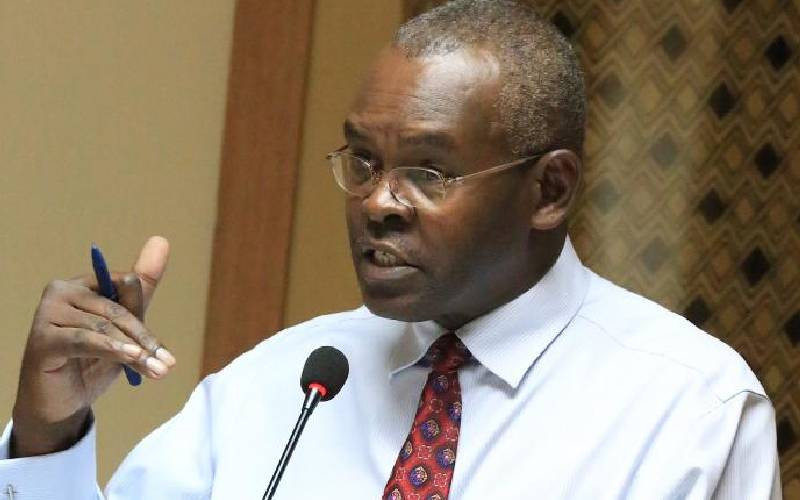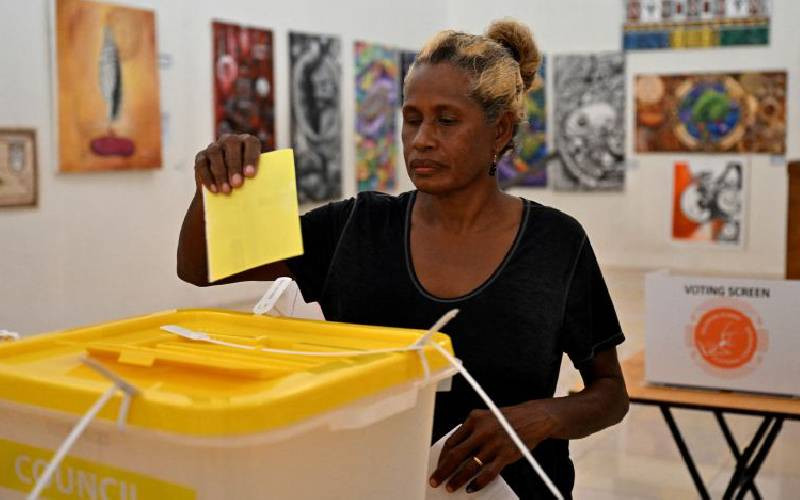 |
|
Kilifi County Assemble Deputy chief whip Majority Gertrude Mbeyu (standing) makes her keynote address during County Assemblies Forum (CAF) to deliberate on the legal interpretation from courts to control County Assemble budget on Monday [PHOTO MOSES OMUSULA] |
NAOROBI, KENYA: Fears of a cash crisis in the counties is growing as a dispute between the National Assembly and the Senate over a crucial Bill holds up funds meant to run county operations.
The Division of Revenue Bill, which shares out revenue between the national and county governments must be approved by both houses of Parliament before the Central Bank of Kenya can authorise spending by counties from their accounts.
Controller of Budget Agnes Odhiambo has also rejected the budgets of several counties as flawed, saying they exceeded set ceilings. So bad is the situation that hundreds of public servants, including those seconded to the counties from the national government, risk going without their July salaries unless Parliament passes the Bill.
Also at risk are service providers to the devolved units who cannot be paid. Counties are now using locally raised revenue, which is not enough, since even monies not spent before the end of the 2013/2014 financial year cannot be accessed.
A huge chunk of the money was released by the National Treasury close to the end of the last financial year, which was June 30. County governments—still heavily dependent on funding from the national government—are now facing a cash crunch.
Odhiambo rejected many of the budgets and sent them back to the respective county governments for revision, but those affected stood their ground, vowing not to make the changes she demanded. They claimed Odhiambo had no legal basis to give such a directive, but she maintained that it was her mandate to advise the Government on prudent use of public funds.
The Controller of Budget said some counties overshot set ceilings for some votes and failed to meet the threshold of ensuring that at least 30 per cent of the budget went to development as stipulated in the Public Finance Management Act. She also said the budgets were not prepared according to the law.
But Members of the County Assemblies (MCAs) accused Odhiambo as well as Commission on Revenue Allocation (CRA) and the Salaries and Remuneration Commission (SRC), led by Micah Cheserem and Sarah Serem respectively, of usurping their powers.
Monday, MCAs led by their Speakers met in Nairobi and declared they would not revise their budgets. They resolved to move to court today, through a team of ten lawyers and financial experts, to force Odhiambo to approve their budgets.
According to Article 224 of the Constitution, County Budgets and their Appropriation Bill — the law which gives counties authority to spend budgeted funds — are supposed to be prepared and adopted “on the basis of the Division of Revenue Bill passed by Parliament under Article 218.
After the Senate and the National Assembly failed to agree on the Bill, they created a mediation committee made up of members of both Houses to iron out the contentious issues.
Odhiambo contends that no money can be released to the counties unless the Bill and the County Allocation of Revenue Bill are passed. “It is true, the budgets are supposed to be based on the Bill (Division of Revenue), which has not been passed. Until these Bills are passed, the funds cannot be released anyway,” she admitted.
Senate Majority Leader Kithure Kindiki, while concurring on the “illegality” of the budgets, said it is a technicality that needs to be navigated in future, as it can be challenged in court.
But he said that at the moment, there is no cause for alarm as the two Houses of Parliament have agreed on the share of national revenue for counties, which do not differ from the figures given to counties by the CRA.
“It is a technicality which we need to cure. May be we should have the Executive bringing these Bills early enough so that counties have time to draw their budgets. Counties should not be doing their budgets before the Division of Revenue Bill is passed,” said Prof Kindiki.
Stay informed. Subscribe to our newsletter
The Chairman of County Speakers Forum Abdi Noor admitted that there was an anomaly in the drawing of the budgets and the passing of the Appropriations Bill by counties.
“Parliament has slept on the job because it has not yet passed the Division of Revenue Bill. We could not wait any longer because it would mean that we wait until they resolve their differences and possibly pass our budgets in September. Anyone can move to court and challenge these budgets, but we are only doing Kenyans justice to save the situation, because we may find ourselves unable to operate if we rely on Parliament’s procedure,” said Dr Noor.
Odhiambo’s spokesman, Mr Stephen Wangaji, said each county budget was considered by the Controller of Budget independently and only those failing the threshold were sent back for revision.
“The Controller of Budget looks at the budgets and, if need be, gives a specific threshold that needs to be met and sends the same back for revision. It is not a blanket issue,” said Wangaji.
“If a count government’s recurrent expenditure does not leave at least 30 per cent for development, as was the case with many of the counties, then the same could not be approved as that is illegal,” he said.
During the County Assemblies Forum Monday, MCAs and County Speakers said they followed the law and that both Odhiambo and Serem have no input in the process.
“It is increasingly looking inevitable that unless the budgets are approved and funds released by next week, civil servants under our system will not be paid,” said Dr Noor.
 The Standard Group Plc is a
multi-media organization with investments in media platforms spanning newspaper
print operations, television, radio broadcasting, digital and online services. The
Standard Group is recognized as a leading multi-media house in Kenya with a key
influence in matters of national and international interest.
The Standard Group Plc is a
multi-media organization with investments in media platforms spanning newspaper
print operations, television, radio broadcasting, digital and online services. The
Standard Group is recognized as a leading multi-media house in Kenya with a key
influence in matters of national and international interest.
 The Standard Group Plc is a
multi-media organization with investments in media platforms spanning newspaper
print operations, television, radio broadcasting, digital and online services. The
Standard Group is recognized as a leading multi-media house in Kenya with a key
influence in matters of national and international interest.
The Standard Group Plc is a
multi-media organization with investments in media platforms spanning newspaper
print operations, television, radio broadcasting, digital and online services. The
Standard Group is recognized as a leading multi-media house in Kenya with a key
influence in matters of national and international interest.









